

Story Specialists: Doctors Who Write. When Doctors Write. The Dr Eric Dark Memorial Lecture Video Recordings and MJA Writing Competition Results. On Saturday 10th March 2012 the winners of the Medical Journal of Australia Writing Competition, sponsored by Varuna, were announced at the Dr Eric Dark Memorial Dinner.
The 110 entries from around Australia were shortlisted by the MJA and Varuna and the winners were selected in consultation with judge Dr Leah Kaminsky, one of Varuna’s alumni and now a literary editor at the MJA. The winners were Dr Susan E. Fox, with her entry “Hands off the Breech” and ANU student Paulina Wojciechowska with her entry “In my darkness”. Both entries have been published in April’s edition of the Medical Journal of Australia. This month the journal also features an interview with doctor and writer Peter Goldsworthy.
On the night, the Dr Eric Dark Memorial Lecture was presented by Associate Professor Grant Blashki and in the video below he is introduced by Dr Tanveer Ahmed. Creative writing workshops for medical education: learning from a pilot study with hospital staff. + Author Affiliations Correspondence to: Mrs S Gull, Consultant Obstetrician and Gynaecologist, Cambridge Graduate Course Supervisor, West Suffolk Hospital, Bury St Edmunds, Suffolk IP33 2QZ, UK; segull@network.co.uk Abstract.
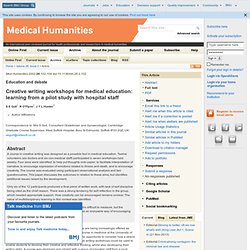
Course: ME33XX Creative Writing for Medical Students. The course is designed to offer students the opportunity to develop their creativity and practical literary skills in a highly supportive, constructive learning environment.
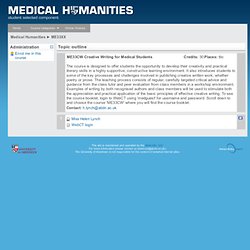
It also introduces students to some of the key processes and challenges involved in publishing creative written work, whether poetry or prose. The teaching process consists of regular, carefully targeted critical advice and guidance from the class tutor and peer evaluation from class members in a workshop environment. Examples of writing by both recognised authors and class members will be used to stimulate both the appreciation and practical application of the basic principles of effective creative writing. To see the course booklet, login to WebCT using 'medguest' for username and password.
Scroll down to and choose the course 'ME33CW' where you will find the course booklet. Contact: h.lynch@abdn.ac.uk. Scalpel, Forceps…Pen?: The Role of Creative Writing in Medical Education. A recent article in The Wall Street Journal reported a trend on teaching humanities in medical school to comply with a recommendation to teach compassionate care.
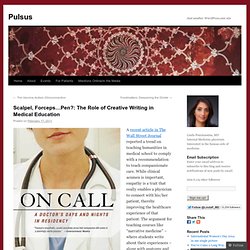
While clinical acumen is important, empathy is a trait that really enables a physician to connect with his/her patient, thereby improving the healthcare experience of that patient. The argument for teaching courses like “narrative medicine” – where students write about their experiences – along with anatomy and pathology, is that exploring and understanding the human side of medicine will enable these doctors-in-training to grow into compassionate physicians. Writing about medical training is not a new concept, however. I had a chance to sit down with physician-author Emily R. Transue, MD*, who started Mind, Body, and Pen, a creative writing class for medical students that is offered every winter (an ideal time for self-reflection in the Pacific Northwest). Hans Steiner M.D. - Introduction. We are a group of physicians who also are creative writers.
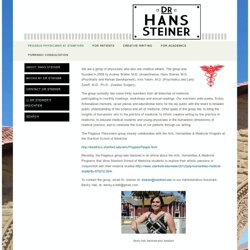
The group was founded in 2008 by Audrey Shafer, M.D. (Anaesthesia), Hans Steiner, M.D. (Psychiatry and Human Development), Irvin Yalom, M.D. (Psychiatry) and Larry Zaroff, M.D., Ph.D., (Cardiac Surgery). The group currently has some thirty members from all branches of medicine participating in monthly meetings, workshops and annual readings. The Pegasus Physicians group closely collaborates with the Arts, Humanities & Medicine Program at the Stanford School of Medicine: Recently, the Pegasus group was featured in an article about the Arts, Humanities & Medicine Programs that allow Stanford School of Medicine students to explore their artistic passions in conjunction with their medical studies: To contact the group, email Dr. The MJA Dr Eric Dark creative writing prize. When medical school meets creative writing class.
First-year medical student Steven Dondinger wants to be a doctor, but he knows that his future holds something more — writing and publishing poetry.
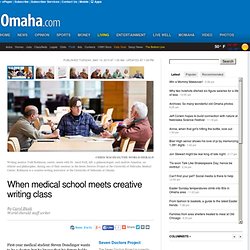
Daily Beast, Portrait of the Writer, 01-14-09.pdf. How to Become a Doctor-Writer, by David Hellerstein, MD. How did you get interested in being a doctor and writer?
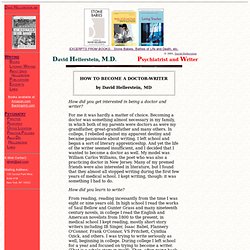
For me it was hardly a matter of choice. Becoming a doctor was something almost necessary in my family, in which both of my parents were doctors as were my grandfather, great-grandfather and many others. In college, I rebelled against my apparent destiny and became passionate about writing. I left school and began a sort of literary apprenticeship. And yet the life of the writer seemed insufficient, and I decided that I wanted to become a doctor as well. How did you learn to write? From reading, reading incessantly from the time I was eight or nine years old.
The Seven Doctors Project: Creative Writing As Inspiration And Intervention. A prescription for creative writing. By Liza Weisstuch Special to the Gazette Hearing the phrase "What do you make of her headache?
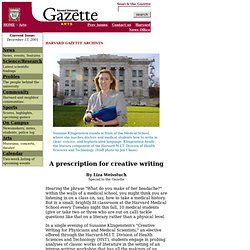
" within the walls of a medical school, you might think you are listening in on a class on, say, how to take a medical history. But in a small, brightly lit classroom at the Harvard Medical School every Tuesday night this fall, 10 medical students (give or take two or three who are out on call) tackle questions like that on a literary rather than a physical level. Creative writing helps doctors empathise with patients. You might be sceptical if your doctor prescribed you poetry rather than painkillers.
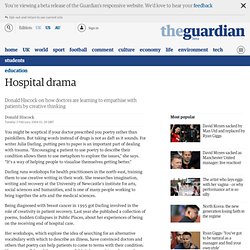
But taking words instead of drugs is not as daft as it sounds. For writer Julia Darling, putting pen to paper is an important part of dealing with trauma. "Encouraging a patient to use poetry to describe their condition allows them to use metaphors to explore the issues," she says. "It's a way of helping people to visualise themselves getting better. " Darling runs workshops for health practitioners in the north-east, training them to use creative writing in their work.
Being diagnosed with breast cancer in 1995 got Darling involved in the role of creativity in patient recovery. Her workshops, which explore the idea of searching for an alternative vocabulary with which to describe an illness, have convinced doctors and others that poetry can help patients to come to terms with their condition. Creative writing may make doctors better.